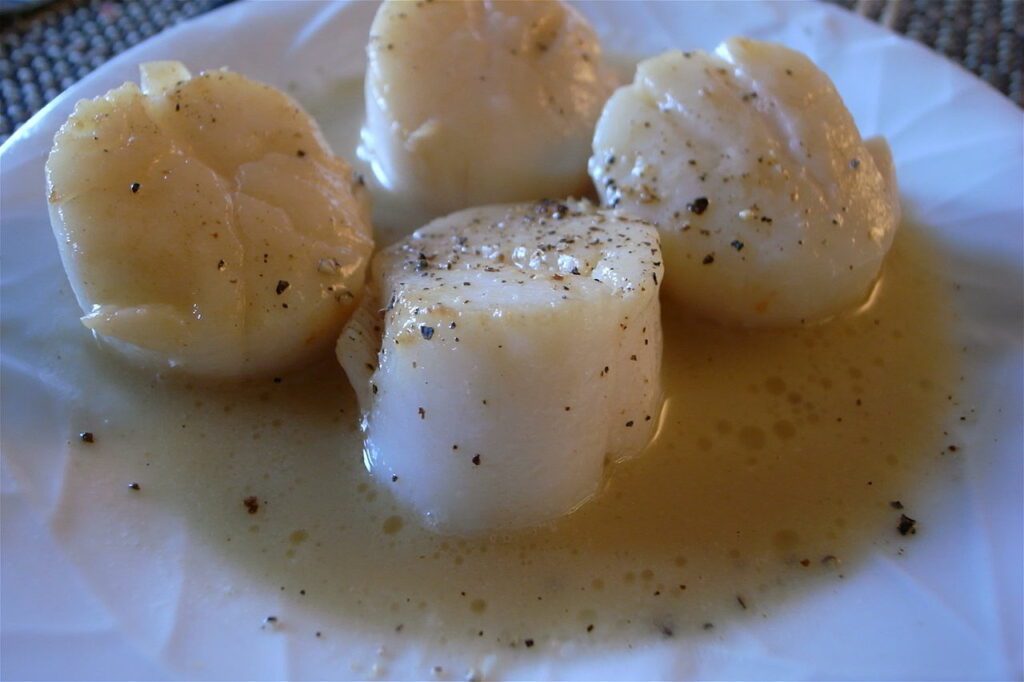If you’re a dog owner and a seafood lover, you may be wondering if your furry friend can indulge in a few scallops with you.
While scallops can be a nutritious and delicious addition to a human’s diet, it’s important to consider their effects on your dog’s health.
In this article, we’ll explore whether or not dogs can safely eat scallops, and provide some tips and best practices for including seafood in your pup’s diet.
- Can Dogs Eat Scallops?
- How Many Scallops Can Dogs Eat?
- How Often Can Dogs Eat Scallops
- Health Benefits of Scallops To Dogs
- Potential Risks of Feeding Scallops To Dogs
- Nutritional Benefits of Scallops For Dogs
- Are Dogs Sensitive To Scallops?
- How To Prepare Scallops For Dogs
- How Fast Will Dogs Digest Scallops
- FAQs
- In Conclusion
Can Dogs Eat Scallops?

Yes, dogs can eat scallops as long as they are cooked and served in moderation. Scallops are an excellent source of protein, magnesium, and potassium.
Protein helps your pet maintain healthy muscles. It is important to note that raw scallops can cause shellfish poisoning and should be avoided.
If you’re considering adding scallops to your dog’s diet, it is best to consult with a veterinarian first.
They will be able to provide advice on how much and how often your pup should be eating scallops for optimal health benefits.
See also: Top 10 Safe Seafood Options For Dogs To Eat
How Many Scallops Can Dogs Eat?

The amount of scallops a dog can eat depends on their size, weight, and overall health. As a general rule, dogs should not consume more than 10% of their daily caloric intake in treats or human food.
If you plan on feeding your dog scallops, it is important to keep the portions small. A good starting point is to give your pup no more than two ounces of scallops per day.
This amount may vary depending on the individual dog’s dietary needs and activity level.
It’s also important to note that scallops should be served plain without any added spices or seasonings that may upset your dog’s digestive system.
If you’re unsure about the number of scallops to give your dog, consult with your veterinarian.
Scallops Feeding Chart According To Size
| Food | Size | Portion |
|---|---|---|
| Scallops | Toy dogs | 1 ounce |
| Scallops | Small dogs | 1 ounce |
| Scallops | Medium dogs | 2 ounces |
| Scallops | Large Dogs | 3 ounces |
Scallops Feeding Chart According To Age
| Food | Age | Portion |
|---|---|---|
| Scallops | 0 – 6 months | Don’t feed |
| Scallops | 6 – 12 months | 1 ounce |
| Scallops | 12 – 24 months | 3 ounces |
| Scallops | 24+ months | 1 ounce per body weight |
How Often Can Dogs Eat Scallops
Scallops can be a healthy and tasty addition to your dog’s diet, but they should be fed in moderation as an occasional treat. It is recommended that you do not give your dog scallops more than once or twice a week.
As with any human food, it is important to watch your dog’s behavior and digestive system to ensure they are not experiencing any adverse effects.
If you notice any vomiting, diarrhea, or other gastrointestinal symptoms after feeding scallops to your dog, stop immediately and consult your veterinarian.
It is always best to consult with a veterinarian before making any changes or additions to your dog’s diet.
They can help you determine the appropriate amount of scallops to feed your specific dog based on their individual dietary requirements.
Health Benefits of Scallops To Dogs
- High-quality protein source. Scallops contain high-quality protein which helps maintain and support healthy muscles. Protein is essential for dogs at all stages of life, from puppies to seniors.
- Rich in Vitamins B12 and B6. Scallops are rich in vitamins B12 and B6, which support the nervous system and ensure proper brain function. Vitamin B12 also helps the body produce red blood cells to carry oxygen throughout the body.
- Promotes healthy skin and coat. Scallops are a good source of omega-3 fatty acids, which are essential for promoting healthy skin and coat. Omega-3s also have anti-inflammatory properties and may help reduce joint pain.
- Good for the heart. Scallops are a low-fat, low-cholesterol source of omega-3 fatty acids. Omega-3s can help maintain good heart health by reducing inflammation and improving circulation.
- Boosts the immune system. Scallops contain antioxidants, such as Vitamin E, which can support the immune system and help reduce inflammation. Additionally, scallops are a good source of minerals like zinc, which support immune function.
Potential Risks of Feeding Scallops To Dogs
- Shellfish poisoning. Raw or undercooked scallops can contain harmful bacteria and toxins that can cause shellfish poisoning, leading to vomiting, diarrhea, and other symptoms.
- Choking hazard. Scallops have a hard and round shell, which can pose a choking hazard for dogs. Always remove the shell and any remaining cartilage or connective tissue before feeding your dog scallops.
- High levels of sodium. Many commercially prepared scallops are high in sodium, which can lead to dehydration, electrolyte imbalances, and other health problems when consumed in excess.
- Allergic reactions. Some dogs may be allergic to scallops or other types of shellfish. If you notice any signs of an allergic reaction, such as itching, swelling, or hives, stop feeding scallops to your dog immediately and contact your veterinarian.
- Digestive upset. Scallops can be high in protein and difficult to digest for some dogs. Too much at once can lead to an upset stomach, vomiting, or diarrhea.
Nutritional Benefits of Scallops For Dogs
| Scallops Nutrition Facts per 100 grams | % DV * |
|---|---|
| Calories | 63 |
| Total Fat | 0 |
| Cholesterol | 23 mg |
| Sugar | 0 g |
| Glycemic Index | 0 |
| Sodium | 378 mg |
| Carbs | 3 g |
| Protein | 12 g |
| Vitamin D | 0% |
| Calcium | 0% |
| Iron | 0% |
| Potassium | 0 mg |
Are Dogs Sensitive To Scallops?
Some dogs may be sensitive to scallops or other types of shellfish, leading to an allergic reaction. Shellfish allergies are uncommon in dogs, but when they do occur, symptoms can be severe.
Symptoms of an allergic reaction to scallops in dogs may include:
- Itching, redness, or swelling of the skin or face
- Hives
- Difficulty breathing
- Vomiting or diarrhea
- Weakness or collapse
If you notice any of these symptoms after your dog consumes scallops, stop feeding them immediately and contact your veterinarian.
In addition to allergic reactions, feeding too many scallops to your dog can lead to digestive upset. This can include symptoms like vomiting, diarrhea, and inappetence.
How To Prepare Scallops For Dogs
- Cooked and plain. The safest way to feed scallops to your dog is to cook them thoroughly and serve them plain, without any added seasonings or spices. Remove the shell and any remaining cartilage or connective tissue before serving your dog a small portion of the cooked scallops.
- Scallop topping. Instead of giving your dog a whole scallop, try chopping up a small number of cooked scallops and using it as a tasty topper for their regular dog food. This provides a nutrient-rich supplement to their diet while also adding a delicious variation to their meals.
- Homemade dog food. If you’re interested in incorporating scallops into your dog’s regular diet, consider making a homemade dog food recipe that includes cooked and shredded scallops. Be sure to follow a recipe designed by a veterinary nutritionist to ensure that the meal is balanced and meets all of your dog’s nutritional needs.
How Fast Will Dogs Digest Scallops
The amount of time it takes for a dog to digest scallops will vary based on the individual dog’s size, health, and metabolism.
In general, dogs have a shorter digestive tract than humans, which means that food moves through their system more quickly.
Protein-dense foods like scallops usually take longer to digest than carbohydrate-rich foods. However, the size of the scallop portion and the dog’s overall diet and health are also factors in digestion time.
As a general rule, it takes around 8-10 hours for a dog to digest a meal.
However, if your dog is experiencing any digestive symptoms like vomiting or diarrhea after eating scallops, it’s possible that it may be having trouble digesting the food. If this happens, consult your veterinarian for an evaluation.
It’s important to note that while scallops can be a healthy addition to your dog’s diet in moderation, they should not make up a significant portion of their daily food intake.
Always feed scallops in moderation and as part of a balanced diet.
FAQs
Can dogs eat scallop roe?
Yes. Dogs can safely eat scallop roe, but it should always be given in moderation. Scallop roe is high in fat and some dogs may have trouble digesting it.
Can dogs eat dried scallops?
Yes, dogs can eat dried scallops in moderation. Dried scallops are a great source of omega-3 fatty acids, which help to keep your pup’s coat healthy and shiny. However, it’s important to be aware that dried scallops may contain high levels of sodium and fat, so you should not give your dog large amounts.
Can dogs eat bacon-wrapped scallops?
No, it’s not safe for dogs to eat bacon-wrapped scallops. Bacon is a high-fat food that can lead to pancreatitis and other digestive issues in dogs. Plus, the cooking process of the scallop may include ingredients that are harmful or toxic to your pooch.
Can dogs eat bay scallops?
Yes, dogs can eat bay scallops. However, it is important to remember that seafood should not make up the bulk of your dog’s diet, and you should always consult with your veterinarian before introducing any new foods into their diet.
Can dogs eat sea scallops?
Yes! Sea scallops can make a delicious treat for your pup. They are packed with protein and nutrients, plus they’re a low-calorie snack that won’t ruin your dog’s diet.
Can dogs eat potato scallops?
Yes, dogs can eat potato scallops, as long as they are cooked and served plain. Potato scallops should not contain any extra ingredients such as salt, butter, or oil. These toppings can be harmful to your pup’s health in high quantities.
In Conclusion
In conclusion, scallops can be a healthy and nutritious addition to your dog’s diet when fed in moderation and prepared safely. Scallops are a good source of protein, omega-3 fatty acids, and minerals like magnesium and potassium.
They can support healthy muscle development, promote healthy skin and coat, and contribute to a healthy immune system.
Related articles:
- Can Dogs Eat Raw or Cooked Salmon?
- Can Dogs Eat Shrimp? Shell-Yeah!
- Can Dogs Eat Tuna? From The Sea To The Bowl
- Can Dogs Eat Cod? A Nutritious Treat For Your Pooch
- Can Dogs Eat Crab? Don’t Be Shellfish, Share Some With Your Pooch
- Can Dogs Eat Lobster? A Gourmet Treat For Your Pooch
- Can Dogs Eat Mussels? To Mussel or Not To Mussel
- Can Dogs Eat Squid? Squid-tastic Addition To Your Dog’s Diet
- Can Dogs Eat Sardines? Tiny Fish, Big Impact





Leave a Reply